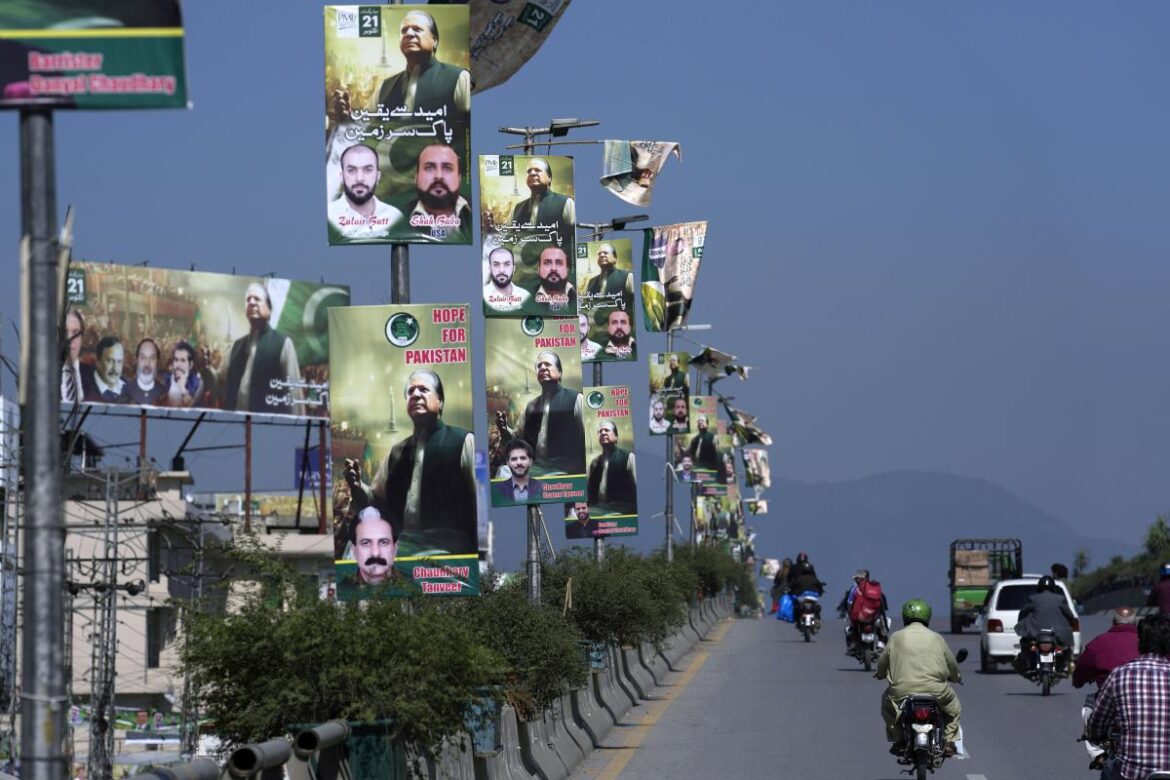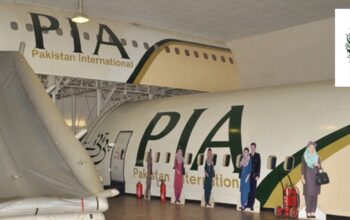By Staff Reporter
ISLAMABAD: When Nawaz Sharif boarded a flight from Dubai to Islamabad on Saturday, he was not just returning to his homeland after four years in exile. He was also embarking on a high-stakes political gamble that could make or break his legacy — and that of the military that has long been his arch-nemesis.
Sharif, a three-time former prime minister who was ousted and jailed by the military in 1999 and 2017, is coming back to a country where the balance of power has shifted dramatically in his favor.
“Today, I am returning to Pakistan after four years and I am feeling very happy,” Sharif told reporters at Dubai airport moments before embarking on a chartered return flight. “When I left Pakistan four years ago, I wasn’t happy at all. But today I am.”
Sharif has been in and out of power, and prison, and the country since he first became prime minister in 1990. He was toppled in a coup by former army chief Pervez Musharraf in 1999 and sent into exile – he returned triumphantly in 2007. Later, Sharif and fellow opposition leader Benazir Bhutto struck a historic deal with the military to take part in the 2007 elections. However, Bhutto was assassinated at an election rally weeks later, and her Pakistan People’s Party (PPP) swept to victory.
Sharif’s party won the 2013 elections.
His third term was cut short in 2017 when he was disqualified by the Supreme Court over corruption charges. Sharif was later convicted and sentenced to jail. He flew to London on medical grounds, where he stayed until this week. In his absence, Sharif was declared an absconder by the courts, which issued warrants for his arrest.
The situation though changed 360. Sharif archrival, Imran Khan, who replaced him as prime minister in 2018 with the backing of the military, is now languishing in prison on corruption charges. And the military, which has ruled Pakistan for nearly half of its 74-year history, appears to have softened its stance toward Sharif, facilitating his bail and allowing him to land without arrest.
But Sharif’s return also poses significant challenges and risks for both him and the military. He will have to prove that he still commands popular support and can mobilize his party, the Pakistan Muslim League-Nawaz (PML-N), ahead of elections expected around late January.
Sharif will also have to navigate the complex, and often treacherous relationship with the generals, who may see him as a potential partner or a threat, depending on how he plays his cards.
Analysts say the military, for its part, will have to contend with the possibility of a resurgent Sharif, who has a history of clashing with them over civilian supremacy.
Still, Sharif’s homecoming is the culmination of a remarkable political comeback that few could have predicted when he left Pakistan in November 2019, months after his party suffered an engineered defeat in the 2018 elections to bring Khan to power.
Khan, a former cricket star and anti-corruption crusader, was seen as a pliant partner for the military, which has a decisive say in almost all matters of state.
But Khan soon found himself at odds with the military over his handling of the economy and postings of key military positions. In April 2022, the parliament removed Khan from power in a no-confidence vote apparently orchestrated by the military establishment and a court eventually sent him to jail after being convicted in a case related to undeclared assets earned from the sale of state gifts during his term as PM.
The conviction has effectively put Khan out of the race in the next election as convicted persons cannot run for public office as per Pakistani law.
There are dozens of other legal cases against Khan, and his Pakistan Tehreek-e-Insaf (PTI) faces a widening crackdown that has seen hundreds of his supporters and members arrested over violent protests in May.
Many of his oldest and closest aides have announced that they were leaving Khan, quitting politics, or joining other parties.
Recent opinion polls and expert analysis, however, suggest that Khan is still the favored leader among a broad section of the public, especially among young and urban voters who are disillusioned with traditional politicians like Sharif.
Analysts say Sharif’s return was made possible by a surprising change of heart by the authorities, which granted him protective bail until Tuesday, preventing him from being arrested upon landing.
Sharif, who is 73 and has a history of heart problems, has also visibly changed his political stance from demanding civilian supremacy over the military to focusing on development and prosperity.
The military, in turn, sees Sharif as a counterweight to Khan’s popularity and a potential partner ahead of elections expected around late January, an analyst views.
Sharif is expected to reach Islamabad before moving to Lahore late in the evening to address a rally of his supporters from the Pakistan Muslim League-Nawaz (PML-N) party.
The event is an attempt to demonstrate the PML-N’s political muscle and Sharif’s enduring popularity in a crisis-plagued country where his rival – the jailed Khan – still enjoys widespread public support.
However, analysts said Sharif’s return shows that the landscape and script of Pakistani politics haven’t changed a bit and that only the political characters have changed.
In the 2018 elections, Khan was facilitated by the establishment during the elections. This time, the army is busy making elections for Sharif, one political commentator says.
If Sharif plays by the rules of the game and does not challenge the military’s prerogatives, then there is a possibility of some stability and continuity to the country’s bumpy road to democracy. But if he tries to assert civilian supremacy or confronts the military on key issues, then there is a possibility of another crisis.
The elections have been delayed several times. The Election Commission of Pakistan has said that it will announce the schedule soon and that the polls will be held in the last week of January.
The schedule of elections, though, depends on Sharif’s success in mobilizing support. If he is able to erase the impression that Khan has overwhelming popularity right now, then elections will be held in January-February. If Sharif’s support appears weak, on the other hand, the military leadership might re-evaluate its options.
Copyright © 2021 Independent Pakistan | All rights reserved




